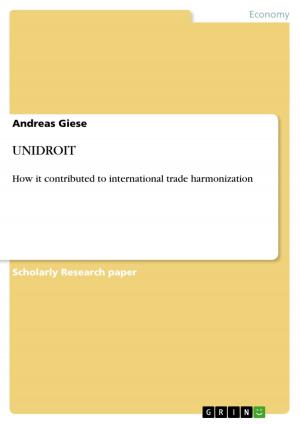Which identity for Europe?
Perspectives on identity formation in the European Union
Nonfiction, Social & Cultural Studies, Social Science, Sociology| Author: | Fabrizio Capogrosso | ISBN: | 9783640262403 |
| Publisher: | GRIN Publishing | Publication: | February 5, 2009 |
| Imprint: | GRIN Publishing | Language: | English |
| Author: | Fabrizio Capogrosso |
| ISBN: | 9783640262403 |
| Publisher: | GRIN Publishing |
| Publication: | February 5, 2009 |
| Imprint: | GRIN Publishing |
| Language: | English |
Seminar paper from the year 2008 in the subject Sociology - Political Sociology, Majorities, Minorities, grade: 1,0, European University Viadrina Frankfurt (Oder), 46 entries in the bibliography, language: English, abstract: In the last decades, debates about the existence and the meaning of an European idetity raised all the time more. Some scholars approached the theme, focussing on a 'common historical heritage', which points to a basis for a collective identity (Habermas 2001; Giesen 2003), others based their arguments on political and institutional similarities among European countries like human rights protection, democracy and rule of law (Risse 2001). In other cases, the studies on the topic focussed on the ambivalent employ of the term 'identity', arguing its (ab)-use, above all in EU-Treaties, instead of more obviously expressions as 'legitimacy' or 'sovereignty' (Bruha/ Rau 2000). The aim of this paper is to examine the topic from two distinctive perspectives: a post-national and a postmodern. The paper suggests a sort of 'back to the roots' of the en-quiry, approaching the subject neither with pre-existent assumptions nor with the goal to order puzzled arguments. The study will not pursue the question about the existence of a collective European identity, but will search for possible ways and circumstances, in which 'identity' in Europe (restricting the focus on the European Union) may emerge. The central question of the paper will be if the development of an European identity is plausible and if a widespread process of socialisation may prevail on the national structures of the member states (hereafter MSs) and lead to the growth of common 'procedures' and 'functions' among European populations. In order to answer the question the more satisfactory as possible, the dissertation proposes two differing angles for the analysis with the intend to compare the findings resulting from dissimilar criteria of examination. In a first part the EU will be considered as a post-national political order, deriving from the dissolution of its MSs. After a short explanation on the political nature of the Union from this standpoint, the dissertation will explore the option of an emerging post-national identity in the European Union, adopting the criteria proposed by Anthony Smith in his study of national identities (Smith 1991). The analysis will evaluate if the EU attends the proposed criteria in order to assess the coming out of a post-national form of social identification. [...]
Seminar paper from the year 2008 in the subject Sociology - Political Sociology, Majorities, Minorities, grade: 1,0, European University Viadrina Frankfurt (Oder), 46 entries in the bibliography, language: English, abstract: In the last decades, debates about the existence and the meaning of an European idetity raised all the time more. Some scholars approached the theme, focussing on a 'common historical heritage', which points to a basis for a collective identity (Habermas 2001; Giesen 2003), others based their arguments on political and institutional similarities among European countries like human rights protection, democracy and rule of law (Risse 2001). In other cases, the studies on the topic focussed on the ambivalent employ of the term 'identity', arguing its (ab)-use, above all in EU-Treaties, instead of more obviously expressions as 'legitimacy' or 'sovereignty' (Bruha/ Rau 2000). The aim of this paper is to examine the topic from two distinctive perspectives: a post-national and a postmodern. The paper suggests a sort of 'back to the roots' of the en-quiry, approaching the subject neither with pre-existent assumptions nor with the goal to order puzzled arguments. The study will not pursue the question about the existence of a collective European identity, but will search for possible ways and circumstances, in which 'identity' in Europe (restricting the focus on the European Union) may emerge. The central question of the paper will be if the development of an European identity is plausible and if a widespread process of socialisation may prevail on the national structures of the member states (hereafter MSs) and lead to the growth of common 'procedures' and 'functions' among European populations. In order to answer the question the more satisfactory as possible, the dissertation proposes two differing angles for the analysis with the intend to compare the findings resulting from dissimilar criteria of examination. In a first part the EU will be considered as a post-national political order, deriving from the dissolution of its MSs. After a short explanation on the political nature of the Union from this standpoint, the dissertation will explore the option of an emerging post-national identity in the European Union, adopting the criteria proposed by Anthony Smith in his study of national identities (Smith 1991). The analysis will evaluate if the EU attends the proposed criteria in order to assess the coming out of a post-national form of social identification. [...]















